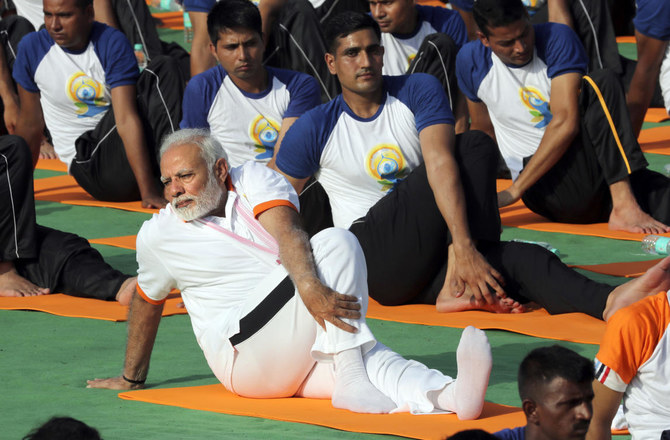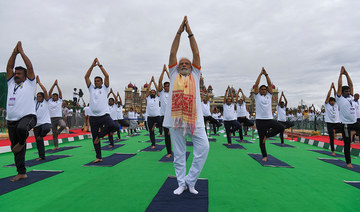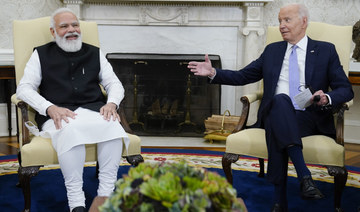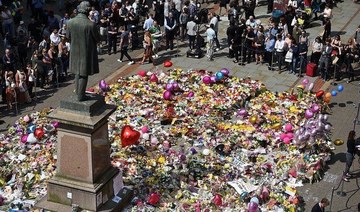UNITED NATIONS: Praising yoga as “truly universal,” Indian Prime Minister Narendra Modi joined a crowd of diplomats and dignitaries for a morning yoga session on Wednesday at the United Nations and kicked off the public portion of his US visit by calmly flexing India’s cultural reach.
With a checkerboard of made-in-India yoga mats covering the UN headquarters’ spacious north lawn, Modi stopped and bowed at a statue of the assassinated Indian independence leader Mahatma Gandhi. Then, in brief remarks, Modi turned to the topic at hand, portraying yoga as an all-ages, try-it-anywhere practice accessible to all faiths and cultures.
“When we do yoga, we feel physically fit, mentally calm and emotionally content. But it is not just about doing exercise on a mat,” Modi said. “Yoga is a way of life.”
Then the leader of the world’s most populous nation took his spot on a mat amid the throng, hands folded, as a yoga instructor led the opening chants and a cloud-filtered sun glinted off the adjacent East River and the flags of the world body’s member nations rippled in the breeze.
The event honors the International Day of Yoga, which Modi persuaded the UN to designate in 2014 as an annual observance.
Modi arrived in New York on Tuesday for a trip that will offer plenty of time to discuss global tensions. But starting out by highlighting an ancient pursuit of inner tranquility is a savvy and symbolic choice for a premier who has made yoga a personal practice and a diplomatic tool.
Modi, a Hindu nationalist, casts himself as an ascetic who adheres to his religion’s strictures on vegetarianism and yoga. He has posted social media videos over the years of himself practicing yoga poses (to say nothing of providing live visuals of him meditating in a Himalayan mountain cave after national elections in 2019).
Modi last visited the UN during the 2021 General Assembly, where he said that “all kinds of questions have been raised about the UN” and its effectiveness on matters including climate change, the coronavirus pandemic and terrorism.
He also made a point of staking out his country’s place in the international community, noting that “every sixth person in the world is Indian.” In the years since his speech, India has surpassed China to claim the world’s largest population, at 1.425 billion.
India has long sought a permanent seat on the Security Council, the UN’s most powerful organ. India has been elected to a two-year seat several times, most recently for 2021-22.
Modi planned to head to Washington later Wednesday for a three-day visit that includes an Oval Office meeting with President Joe Biden, an address to a joint meeting of Congress, a White House state dinner and more. Among the plans: a State Department luncheon hosted by Vice President Kamala Harris, whose mother was born in India, and by Secretary of State Antony Blinken.
The visit comes as both countries are interested in strengthening ties.
The US has been looking to India, also the world’s biggest democracy, as a key partner on matters that include checking China’s ambitions in the Indo-Pacific region. India, meanwhile, wants to bolster military and trade connections with the US
However, human rights advocates are urging Biden to press Modi on human rights issues, both international and within India. Modi has faced criticism over legislation that fast-tracks citizenship for some migrants but excludes Muslims; a rise in violence against Muslims and other religious minorities by Hindu nationalists; and the recent conviction of India’s top opposition leader, Rahul Gandhi, for mocking Modi’s surname. (Gandhi recently visited the US himself, speaking to private organizations and university students.)
The Indian government defends its human rights record and insists that the nation’s democratic principles remain rock-solid.
On Tuesday evening, Modi met with a range of prominent US academics and health experts, scientists and business leaders, including Tesla CEO Elon Musk.
Speaking to media afterwards, Musk said he was excited about India’s future and the opportunities it presented.
“I think India has more promise than any large country in the world,” Musk said, adding that he was confident Tesla “will be in India … as soon as humanly possible.” The tech billionaire last month said his company may pick a location for a new factory by the end of this year and that India was an interesting place for it.
Indian Prime Minister Modi showcases yoga and his country’s cultural diplomacy on the UN lawn
https://arab.news/nvc8p
Indian Prime Minister Modi showcases yoga and his country’s cultural diplomacy on the UN lawn

- “When we do yoga, we feel physically fit, mentally calm and emotionally content. But it is not just about doing exercise on a mat,” Modi said
- The event honors the International Day of Yoga, which Modi persuaded the UN to designate in 2014 as an annual observance
India vote to resume with Kashmir poised to oppose Modi

- Modi remains popular across much of India and his Hindu-nationalist Bharatiya Janata Party (BJP) is widely expected to win the poll when it concludes early next month
SRINAGAR, India: India’s six-week election is set to resume Monday including in Kashmir, where voters are expected to show their discontent with dramatic changes in the disputed territory under Prime Minister Narendra Modi’s government.
Modi remains popular across much of India and his Hindu-nationalist Bharatiya Janata Party (BJP) is widely expected to win the poll when it concludes early next month.
But his government’s snap decision in 2019 to bring Kashmir under direct rule by New Delhi — and the drastic security clampdown that accompanied it — have been deeply resented among the region’s residents, who will be voting for the first time since the move.
“What we’re telling voters now is that you have to make your voice heard,” said former chief minister Omar Abdullah, whose National Conference party is campaigning for the restoration of Kashmir’s former semi-autonomy.
“The point of view that we want people to send out is that what happened... is not acceptable to them,” he told AFP.
Kashmir has been divided between India and Pakistan since their independence in 1947. Both claim it in full and have fought two wars over control of the Himalayan region.
Rebel groups opposed to Indian rule have waged an insurgency since 1989 on the side of the frontier controlled by New Delhi, demanding either independence or a merger with Pakistan.
The conflict has killed tens of thousands of soldiers, rebels and civilians in the decades since, including a spate of firefights between suspected rebels and security forces in the past month.
Violence has dwindled since the Indian portion of the territory was brought under direct rule five years ago, a move that saw the mass arrest of local political leaders and a months-long telecommunications blackout to forestall expected protests.
Modi’s government says its canceling of Kashmir’s special status has brought “peace and development,” and it has consistently claimed the move was supported by Kashmiris.
But his party has not fielded any candidates in the Kashmir valley for the first time since 1996, and experts say the BJP would have been roundly defeated if it had.
“They would lose, simple as that,” political analyst and historian Sidiq Wahid told AFP last week.
The BJP has appealed to voters to instead support smaller and newly created parties that have publicly aligned with Modi’s policies.
But voters are expected to back one of two established Kashmiri political parties calling for the Modi government’s changes to be reversed.
India’s election is conducted in seven phases over six weeks to ease the immense logistical burden of staging the democratic exercise in the world’s most populous country.
More than 968 million people are eligible to vote in India’s election, with the final round of polling on June 1 and results expected three days later.
Turnout so far has declined significantly from the last national poll in 2019, according to election commission figures.
Analysts have blamed widespread expectations that Modi will easily win a third term and hotter-than-average temperatures heading into the summer.
India’s weather bureau has forecast more hot spells in May and the election commission formed a taskforce last month to review the impact of heat and humidity before each round of voting.
Civilians evacuated from northeast Ukraine as Russia steps up assault

- Heavy fighting raged on Sunday as Russia attacks 27 settlements
KYIV: Thousands more civilians have fled Russia’s renewed ground offensive in Ukraine’s northeast that has targeted towns and villages with a barrage of artillery and mortar fire, officials said Sunday.
The intense battles have forced at least one Ukrainian unit to withdraw in the Kharkiv region, capitulating more land to Russian forces across less defended settlements in the so-called contested “gray zone” along the Russian border.
Meanwhile, a 10-story apartment block collapsed in the Russian city of Belgorod, near the border, with several deaths and injuries reported. Russian authorities said the building collapsed following Ukrainian shelling. Ukraine has not commented on the incident.
HIGHLIGHT
The Russian Defense Ministry said Saturday that Moscow’s forces had captured five villages on the border of Ukraine’s Kharkiv region and Russia. Ukraine’s leadership has not confirmed Moscow’s gains.
At least 4,000 civilians have fled the Kharkiv region since Friday, when Moscow’s forces launched the operation, Gov. Oleh Syniehubov said in a social media statement. Heavy fighting raged Sunday along the northeast front line, where Russian forces attacked 27 settlements in the past 24 hours, he said.
Analysts say the Russian push is designed to exploit ammunition shortages before promised Western supplies can reach the front line. Ukrainian soldiers said the Kremlin is using the usual Russian tactic by launching a disproportionate amount of fire and infantry assaults to exhaust their troops and firepower.
It comes after Russia stepped up attacks in March targeting energy infrastructure and settlements, which analysts predicted were a concerted effort by Moscow to shape conditions for an offensive.
Ukrainian President Volodymyr Zelenskyy said that disrupting Russia’s offensive in the area was a priority, and that Kyiv’s troops were continuing counteroffensive operations in seven villages around the Kharkiv region.
“Disrupting the Russian offensive intentions is our number one task now. Whether we succeed in that task depends on every soldier, every sergeant, every officer,” Zelenskyy said.
The Russian Defense Ministry said Saturday that Moscow’s forces had captured five villages on the border of Ukraine’s Kharkiv region and Russia. These areas were likely poorly fortified due to the dynamic fighting and constant heavy shelling, easing a Russian advance.
Ukraine’s leadership has not confirmed Moscow’s gains.
Black, Asian and minority ethnic people make up nearly 70% of UK’s anti-terror detentions, data shows

- Fewer than 1 in 5 who were stopped were recorded as white
LONDON: Nearly 70 percent of people stopped at UK ports under anti-terrorism laws since 2021 were from Black, Asian and minority ethnic backgrounds, new figures released on Sunday show.
The Guardian newspaper requested police data under freedom of information laws, which also revealed fewer than one in five who were stopped were recorded as white.
Campaigners have criticized the statistics, saying they prove the UK’s anti-terrorism laws are disproportionately affecting Black and minority ethnic groups and not being used effectively enough to arrest the rise of far-right, white extremism, The Guardian reported.
Of the 8,095 people stopped at UK ports since 2021 under Schedule 7 of the Terrorism Act 2000, 5,619 (69.4 percent) were recorded as being from Black, Asian and minority ethnic backgrounds, compared with 1,585 (19.6 percent) recorded as white British, white Irish or white other stopped under the same law.
The head of public advocacy at the anti-Islamophobia group Cage International has also pressed British police to publish data on the religious background of those stopped under the Terrorism Act.
Anas Mustapha said: “This new data reaffirms what we already know about its racist and Islamophobic impact. However, despite evidence demonstrating that the majority of those stopped are Muslim and that forces record data on religion, the government has resisted calls to produce a religious breakdown of those harassed at the borders.
“Schedule 7 is one of the most intrusive and discriminatory of all police powers. We’ve supported hundreds of British holidaymakers impacted by the policy and it’s clear that the power is abused and must be repealed.”
A spokesman from the UK’s counter-terrorism police said the law was a “vital tool” in collecting evidence to support convictions of terrorists, as well as helping with intelligence-gathering in the prevention of attacks on British streets.
“The use of Schedule 7 powers regularly features in some of our most complex and high-risk investigations and prosecutions,” the spokesman said.
“We face an enduring terrorist threat from overseas, and whilst we are seeing a much greater prevalence of online activity, travel remains an element of terrorist methodology that provides us with potentially crucial opportunities to act.
“Where the powers are used, there are a range of robust safeguards and measures in place to ensure appropriate usage.”
OIC calls for immediate aid amid Afghan flood crisis

- Flash floods from seasonal rains in Baghlan province in northern Afghanistan
RIYADH: The Organization of Islamic Cooperation has issued an urgent appeal to its member states as well as relief organizations to provide aid to the Afghan people amid catastrophic flooding which has hit the country, Saudi Press Agency reported on Sunday.
Flash floods from seasonal rains in Baghlan province in northern Afghanistan killed at least 315 people since striking on Friday, a UN report said.
Rains also caused heavy damage in northeastern Badakhshan province and central Ghor province, officials said.
Since mid-April, floods have left about 100 people dead in 10 of Afghanistan’s provinces, with no region entirely spared, according to authorities.
Farmland has been swamped in a country where 80 percent of the more than 40 million people depend on agriculture to survive.
UK investigating Hamas’ claim that British hostage killed in Gaza

- Foreign secretary confirms viewing video
LONDON: The UK’s Foreign Office said on Sunday it was investigating a claim by Hamas that a British-Israeli hostage in Gaza had died from injuries sustained in an Israeli airstrike over a month ago.
Nadav Popplewell, 51, was captured along with his mother Channah Peri on Oct. 7 during a border incursion when the Palestinian group launched a surprise attack on Israel.
The Foreign Office said it was actively seeking more information on the matter.
Popplewell’s family has requested media outlets refrain from airing footage released by Hamas, showing him in captivity with visible injuries, the BBC reported.
The UK’s Foreign Secretary David Cameron, speaking to the BBC’s Laura Kuenssberg, confirmed viewing the video but provided no further updates on the investigation.
Cameron said: “We don’t want to say anything until we have better information.”
He described Hamas as “callous” for releasing the video and playing “with the family’s emotions in that way.”
The Foreign Office added that the department’s thoughts “are with his family at this extremely distressing time.”
The Israeli military has not issued a statement on the matter.
Israel’s military campaign in Gaza to destroy Hamas has killed over 34,900 people, the majority of whom are women and children, according to the Gaza Health Ministry.
Israel has reported that 128 hostages are unaccounted for.






















